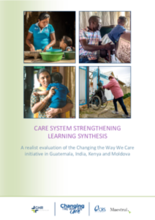Changing the Way We Care (CTWWC) is a global initiative which promotes safe, nurturing family care for children. Since 2018, the focus has been on the reform of national systems of care for children, grounded in demonstration country work in Guatemala, India, Kenya and Moldova. The vision was to learn about change in diverse settings and across the varied components of the care system, such as laws, services, and workforce. Over the last year, as its core funding was coming to an end, CTWWC undertook an evaluation, following a realist approach, to explore commonalities and differences across the different contexts. By synthesizing the learning it is hoped that care reform actors will be able to find relevant learning that can be applied to a wider range of contexts.
The report titled “Care System Strengthening Learning Synthesis” explores how change unfolded across five system components—legislation and policy, social service workforce, financing, monitoring and evaluation, and service delivery—using a context-intervention-mechanism-outcome (CIMO) framework. It highlights how evidence-based advocacy, government ownership, multi-stakeholder collaboration, and capacity-building were key drivers of reform, and how aligning with broader agendas and adapting to challenges helped sustain momentum.
The report concludes with recommendations for governments and organizations supporting care reform. Governments are encouraged to embed family care into policy and budgets, strengthen coordination, invest in workforce development, and institutionalize evidence use. Supporting organizations are advised to align with national strategies, build capacity through accompaniment, engage people with lived experience, and leverage demonstration models to scale reforms. The report emphasizes the importance of integrated, long-term approaches to system strengthening and calls on the global care reform sector to continue sharing learning and evidence to ensure all children grow up in safe, nurturing family environments.
See also:
- Care System Strengthening Learning Synthesis: Evaluation Summary
- Outcome Harvesting within Changing the Way We Care Report 1: Methodological Insights
- Outcome Harvesting within Changing the Way We Care Report 2: Results and System Strengthening Learning
- Outcome Harvesting within Changing the Way We Care: Database Template

